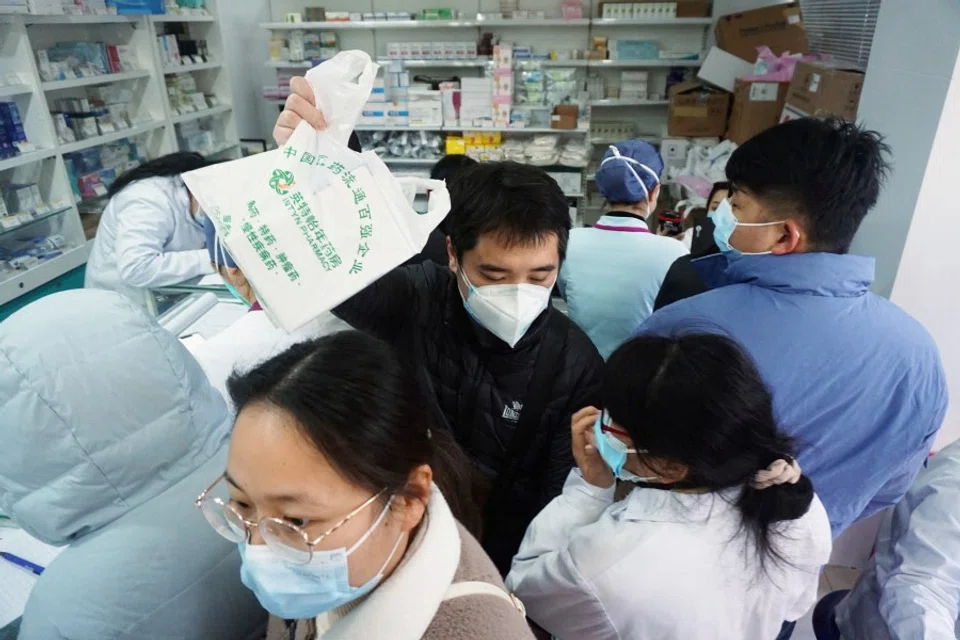China prepares for Covid peaks in January
With the easing of Covid controls in China, many cities and provinces are seeing a sharp spike in cases. This wave is generally expected to peak in January next year, especially with the Chinese New Year travel wave. Lianhe Zaobao journalist Liu Liu takes a look at the possible direction and responses.

The local governments of Zhejiang, Shandong, and Guangzhou city in Guangdong have forecast Covid peaks in mid-January 2023, while Baidu figures also show that searches for keywords such as "fever" and "ibuprofen" as well as Covid spikes are increasing throughout China.
Academics interviewed said Covid peaks might bring risks such as hospital infections and shortages of healthcare workers. More importantly, the outbreaks are concentrated in big cities, where the Chinese New Year travel wave means the population will bring the virus to third- and fourth-tier cities as well as rural areas, which makes the Covid controls of rural areas more crucial.
Covid peaks expected in mid Jan 2023
Since 7 December, when China announced the new "ten measures" for easing Covid controls, Covid cases have risen rapidly. Guangzhou held a press conference on 19 December, citing expert forecasts that cases will peak in the first half of January next year.
... most areas including the cities mentioned above are expected to see Covid peaks around 10 to 20 January next year, similar to official forecasts.

At a press conference on 18 December, Zhejiang said that going by various studies and models within and outside of China, the first wave is expected to peak around the middle of January next year. On 15 December, Zhejiang also forecast that the height of the next wave in the province is expected in late December or early January, peaking around Chinese New Year. That same day, Shandong said the height of the next wave is expected in January next year, while the peak in the rural areas will come relatively later.
Baidu's figures for "Covid hot searches" show that while searches for "fever", "antigen" and "ibuprofen" shot up in Beijing, Guangzhou, Chongqing and other heavily hit areas before coming down last week, related searches in other areas continue to rise, and most areas including the cities mentioned above are expected to see Covid peaks around 10 to 20 January next year, similar to official forecasts.
Rural China to brace for Covid-19
Vicky Qin Mengqi, a researcher at the Centre for Population Health Sciences, Lee Kong Chian School of Medicine, Nanyang Technological University, told Zaobao that the most immediate risk of the peak of the pandemic is the impact on the healthcare system, especially the shortage of healthcare workers following healthcare-associated infections.
When they return to their hometowns during the Spring Festival, the rural areas could be hit by a massive Covid-19 outbreak...

She added, "Another prominent problem is China's complex population composition and their high mobility." Qin pointed out that the current outbreak is concentrated in the major cities, where workers from third and fourth tier cities, as well as migrant workers from rural areas, gather. When they return to their hometowns during the Spring Festival, the rural areas could be hit by a massive Covid-19 outbreak, which calls into question whether there would be an adequate supply of medical resources and drugs in these areas.
After mainland China reported two new Covid-19 deaths on 18 December, it again reported five new Covid-19 deaths a day later, both in the capital Beijing. Mi Feng, a spokesperson for the National Health Commission, said on 20 December that healthcare organisations have been under increased pressure recently and that it is important to monitor the health of healthcare workers and implement the necessary incentive policies. He also reiterated the importance of enhancing epidemic prevention work and health services in rural areas, opening as many fever clinics as possible in townships, and strengthening prescription and follow-up services.
Pharmacies in Beijing, Nanjing, Zhuhai and other areas will also sell loose tablets of fever medications, with a limit of six tablets per customer.
Medicine shortages can be managed
Also, in response to the shortage of fever medications in several regions, China's State Administration for Market Regulation said on 20 December that it will devote "unprecedented efforts and measures" to stabilise drug prices and ensure quality control. "Precise supervision" of pharmaceutical companies would also be carried out to increase drug production. Pharmacies in Beijing, Nanjing, Zhuhai and other areas will also sell loose tablets of fever medications, with a limit of six tablets per customer.
The main reason for drug shortages is due to people's anxiety and stockpiling behaviour.

Qin thinks that this policy is reasonable because people infected with the Omicron variant usually recover within a week and only require a small amount of drugs. The main reason for drug shortages is due to people's anxiety and stockpiling behaviour. As people gain a better understanding of the Omicron variant, she believes that drug shortages will be alleviated.
This article was first published in Lianhe Zaobao as "中国多地预测下月为疫情高峰期 学者:春节返乡期农村防疫关键".
Related: From zero-Covid to living with the virus: Chinese society's adaptability put to the test | China's reopening will not lead to a million deaths | Will mainland China see a 'tsunami' of Covid cases? | Is China ill-prepared for a surge in Covid cases? | What can we expect now that China's 'zero-Covid' is no more





![[Photos] Fact versus fiction: The portrayal of WWII anti-Japanese martyrs in Taiwan](https://cassette.sphdigital.com.sg/image/thinkchina/3494f8bd481870f7c65b881fd21a3fd733f573f23232376e39c532a2c7593cbc)